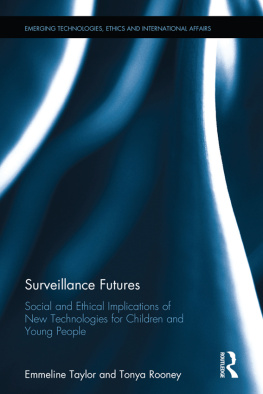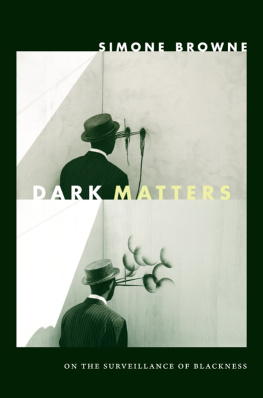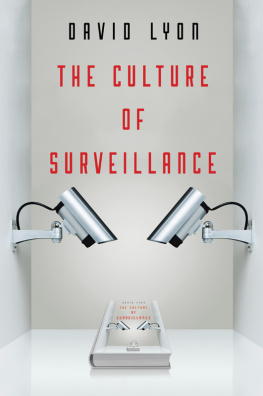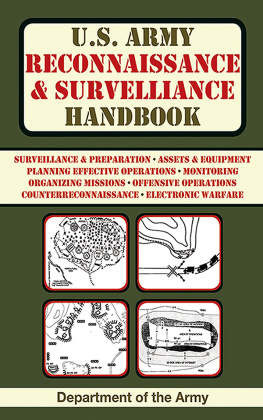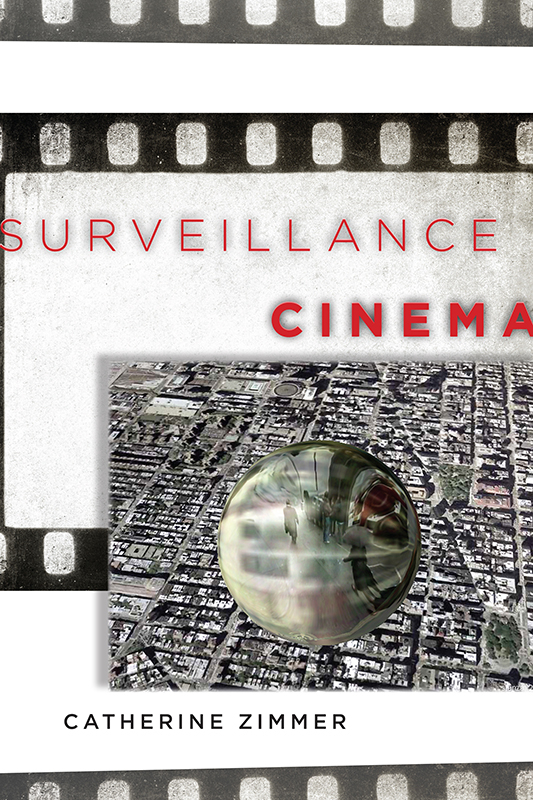References to Internet websites (URLs) were accurate at the time of writing. Neither the author nor New York University Press is responsible for URLs that may have expired or changed since the manuscript was prepared.
Surveillance cinema / Catherine Zimmer.
pages cm. -- (Postmillennial pop)
Includes bibliographical references and index.
ISBN 978-1-4798-6437-9 (cl : alk. paper) -- ISBN 978-1-4798-3667-3 (pb : alk. paper)
1. Electronic surveillance in motion pictures. I. Title.
New York University Press books are printed on acid-free paper, and their binding materials are chosen for strength and durability. We strive to use environmentally responsible suppliers and materials to the greatest extent possible in publishing our books.
I would like to extend enormous thanks to those who have helped me in the writing of this booka process that exceeds, in so many ways, what I have written.
Many thanks to Sarah Blackwood, Tom Henthorne, Sid Ray, Stephanie Hsu, Erica Johnson, Patricia Pender, Matthew Bolton, Emily Welty, Helane Levine-Keating, and Nancy Reagin for creating a community of support at Pace University. I am tremendously grateful to Ruth Johnston, founding director of Film and Screen Studies at Pace, for her mentoring and support, and to Dean Nira Hermann, Associate Deans Richard Schlesinger and Adelia Williams, and the Scholarly Research Committee for their ongoing sponsorship of my projects. Thanks also to Cathy Dwyer, my co-instructor in a course on surveillance culture, for her insightful perspectives and her commitment to keeping conversations about surveillance politics central to the intellectual community at Pace.
Very special thanks to those who have offered feedback, advice, and assistance with numerous elements of the publication process: Gillian Harkins, Zahid Chaudhary, Matthew Bolton, Tom Henthorne, Homay King, and Aviva Briefel have all been generous with their brilliance and time, and their comments on portions of this book helped me improve them considerably. Mary Peelen, Catherine Mills, Chantal Bruchez-Hall, Meredith Martin, Jasbir Puar, Christina Hanhardt, Eva Hageman, Patricia Shuldiner, Josie Saldaa, David Kazanjian, Rob Miotke, Eric Taylor, and Sara Pursley have each at various moments talked me through ideas, confusion, dismay, etc. Sheila McLaughlin, Jennie Portnof, and Rebecca Coleman have assisted me in more ways than they know, and I am tremendously grateful for their friendship. Barbara Herman and Galadrielle Allman: we have been in this together as long as I can remember. Your talents, insights, and strength inspire me every day.
Eric Zinner, Alicia Nadkarni, and Dorothea Halliday at NYU Press have been and continue to be wonderful to work with, and I want to thank them for their guidance throughout the process. I am, happily, forever indebted to Karen Tongson for shepherding this project through its publication: in no uncertain terms, Karen made this book a reality for me. Many thanks also to her coeditor, Henry Jenkins; I am honored to be included in the Postmillennial Pop series. I am indebted as well to the anonymous reviewers who took such care with the manuscript and whose detailed suggestions have been invaluable. Many thanks also go to Cathy Hannabach, for her excellent work on indexing my book.
In a very different form, this project began in graduate school, and my professors and cohort from UC Berkeley are the gift that keeps on giving. Linda Williams, B. Ruby Rich, and Kaja Silverman: I cant thank them enough for what they taught me about thinking and writing, for their mentoring, and for their continued friendship. Anton Kaes and Marilyn Fabe, and their work in developing a film education at Berkeley, provided the foundation that I am fortunate to stand on, and I am forever grateful for that support. Homay King, Erik Schneider, Barbara Herman, Gillian Harkins, Gayle Salamon, Dale Carrico, James Salazar, David Kazanjian, Rob Miotke, Emma Bianchi, Jill Stauffer, and Amy Zilliax brilliantly disguised the rigors of a graduate education as a group of hilarious, talented, loving, gorgeous weirdoes whom I am now delighted to call family. And my beloved Flippy, who died as I was completing this manuscript, saw me through from graduate school to tenure and beyond, and was the perfect constant throughout. Though he never made the slightest effort to do a damn thing, he has earned a place in print.
Karl Zimmer, Ronelle Alexander, Paul Zimmer, Silvia Valisa, Serafina Valisa, Lucas Zimmer, and my late mother, Suzanne Clements Zimmer: thank you for being my wonderful family. You are all everywhere throughout this book. Finally, I offer immense gratitude and love to Kate Taylor, whose confidence in me and dedication to a world of meaning has been the backbone of this work. It is simply unimaginable to me to have done this without her.
Portions of the Introduction were published as Surveillance Cinema: Narrative between Technology and Politics, in Surveillance and Society vol. 8 no. 4 (Spring 2011). An earlier version of Chapter One was published as Caught on Tape? The Politics of Video in the New Torture Film, in Horror Film after 9/11, edited by Aviva Briefel and Sam Miller (Austin: University of Texas Press, 2011). A different version of Chapter Five was published as Surveillance and Social Memory: Strange Days Indeed, in Discourse vol. 32 no. 3 (Fall 2010). Many thanks to the peer reviewers and editors of these publications for their input on those essays.
Surveillance Cinema in Theory and Practice
In Paris, a video cameras unblinking gaze fixes on the exterior of a bourgeois home and eventually leads to the disintegration of two families. An American labor attorney sprints through a Washington, D.C., high-rise hotel as he evades satellite surveillance and NSA assassins seeking to cover up the political murder of a congressman. A webcam in Portland documents the torture and death of kidnap victims, while each visitor to the host website hastens the death of the subject and each site hit thus becomes a literal act of violence. A terrorist attack in New Orleans is prevented by an experimental surveillance technology and a heroic federal agent









